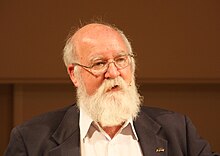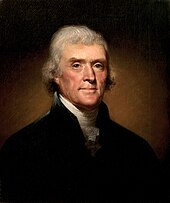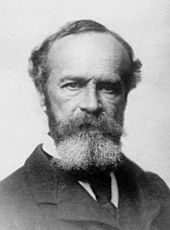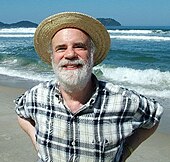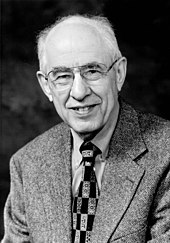Daniel Dennett
| |
|---|---|
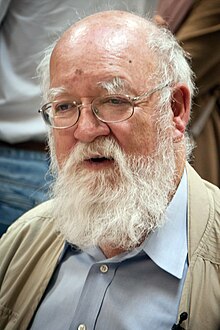
Dennett in 2012
| |
| Born |
Daniel Clement Dennett III
March 28, 1942
Boston, Massachusetts, U.S.
|
| Education | Harvard University (A.B.) Hertford College, Oxford (D.Phil.) |
| Awards | Jean Nicod Prize (2001) Mind & Brain Prize (2011) |
| Era | 20th-/21st-century philosophy |
| Region | Western philosophy |
| School | Analytic philosophy New Atheism |
Main interests
| Philosophy of mind Cognitive science Free will Philosophy of religion |
Notable ideas
| Heterophenomenology Intentional stance Intuition pump Multiple drafts model Greedy reductionism Cartesian theater Belief in belief Free-floating rationale Top-down vs bottom-up design Casette theory of dreams |
| Signature | |
 | |
Daniel Clement Dennett III (born March 28, 1942) is an American philosopher, writer, and cognitive scientist whose research centers on the philosophy of mind, philosophy of science, and philosophy of biology, particularly as those fields relate to evolutionary biology and cognitive science.
As of 2017, he is the co-director of the Center for Cognitive Studies and the Austin B. Fletcher Professor of Philosophy at Tufts University. Dennett is an atheist and secularist, a member of the Secular Coalition for America advisory board, and a member of the Committee for Skeptical Inquiry, as well as an outspoken supporter of the Brights movement. Dennett is referred to as one of the "Four Horsemen of New Atheism", along with Richard Dawkins, Sam Harris, and the late Christopher Hitchens.
Dennett is a member of the editorial board for The Rutherford Journal.
Early life, education, and career
Dennett was born on March 28, 1942 in Boston, Massachusetts, the son of Ruth Marjorie (née Leck) and Daniel Clement Dennett, Jr. Dennett spent part of his childhood in Lebanon, where, during World War II, his father was a covert counter-intelligence agent with the Office of Strategic Services posing as a cultural attaché to the American Embassy in Beirut. When he was five, his mother took him back to Massachusetts after his father died in an unexplained plane crash. Dennett's sister is the investigative journalist Charlotte Dennett.
Dennett says that he was first introduced to the notion of philosophy
while attending summer camp at age 11, when a camp counselor said to
him, "You know what you are, Daniel? You're a philosopher."
Dennett graduated from Phillips Exeter Academy in 1959, and spent one year at Wesleyan University before receiving his Bachelor of Arts in philosophy at Harvard University in 1963. At Harvard University he was a student of W. V. Quine. In 1965, he received his Doctor of Philosophy in philosophy at the University of Oxford, where he studied under Gilbert Ryle and was a member of Hertford College.
His dissertation was entitled "The Mind and the Brain: Introspective
Description in the Light of Neurological Findings; Intentionality".
Dennett in 2008
Dennett describes himself as "an autodidact—or,
more properly, the beneficiary of hundreds of hours of informal
tutorials on all the fields that interest me, from some of the world's
leading scientists".
He is the recipient of a Fulbright Fellowship, two Guggenheim Fellowships, and a Fellowship at the Center for Advanced Study in the Behavioral Sciences. He is a Fellow of the Committee for Skeptical Inquiry and a Humanist Laureate of the International Academy of Humanism. He was named 2004 Humanist of the Year by the American Humanist Association.
In February 2010, he was named to the Freedom From Religion Foundation's Honorary Board of distinguished achievers.
In 2012, he was awarded the Erasmus Prize,
an annual award for a person who has made an exceptional contribution
to European culture, society or social science, "for his ability to
translate the cultural significance of science and technology to a broad
audience."
In 2018, he was awarded an honorary degree by Radboud University, located in Nijmegen, Netherlands for his contributions to and influence on cross-disciplinary science.[24]
Philosophical views
Free will
While he is a confirmed compatibilist on free will, in "On Giving Libertarians What They Say They Want"—Chapter 15 of his 1978 book Brainstorms, Dennett articulated the case for a two-stage model of decision making in contrast to libertarian views.
The model of decision making I am proposing has the following feature: when we are faced with an important decision, a consideration-generator whose output is to some degree undetermined, produces a series of considerations, some of which may of course be immediately rejected as irrelevant by the agent (consciously or unconsciously). Those considerations that are selected by the agent as having a more than negligible bearing on the decision then figure in a reasoning process, and if the agent is in the main reasonable, those considerations ultimately serve as predictors and explicators of the agent's final decision.
While other philosophers have developed two-stage models, including William James, Henri Poincaré, Arthur Holly Compton, and Henry Margenau, Dennett defends this model for the following reasons:
- First ... The intelligent selection, rejection, and weighing of the considerations that do occur to the subject is a matter of intelligence making the difference.
- Second, I think it installs indeterminism in the right place for the libertarian, if there is a right place at all.
- Third ... from the point of view of biological engineering, it is just more efficient and in the end more rational that decision making should occur in this way.
- A fourth observation in favor of the model is that it permits moral education to make a difference, without making all of the difference.
- Fifth—and I think this is perhaps the most important thing to be said in favor of this model—it provides some account of our important intuition that we are the authors of our moral decisions.
- Finally, the model I propose points to the multiplicity of decisions that encircle our moral decisions and suggests that in many cases our ultimate decision as to which way to act is less important phenomenologically as a contributor to our sense of free will than the prior decisions affecting our deliberation process itself: the decision, for instance, not to consider any further, to terminate deliberation; or the decision to ignore certain lines of inquiry.
These prior and subsidiary decisions contribute, I think, to our sense of ourselves as responsible free agents, roughly in the following way: I am faced with an important decision to make, and after a certain amount of deliberation, I say to myself: "That's enough. I've considered this matter enough and now I'm going to act," in the full knowledge that I could have considered further, in the full knowledge that the eventualities may prove that I decided in error, but with the acceptance of responsibility in any case.
Leading libertarian philosophers such as Robert Kane
have rejected Dennett's model, specifically that random chance is
directly involved in a decision, on the basis that they believe this
eliminates the agent's motives and reasons, character and values, and feelings and desires. They claim that, if chance is the primary cause of decisions, then agents cannot be liable for resultant actions. Kane says:
[As Dennett admits,] a causal indeterminist view of this deliberative kind does not give us everything libertarians have wanted from free will. For [the agent] does not have complete control over what chance images and other thoughts enter his mind or influence his deliberation. They simply come as they please. [The agent] does have some control after the chance considerations have occurred.
But then there is no more chance involved. What happens from then on, how he reacts, is determined by desires and beliefs he already has. So it appears that he does not have control in the libertarian sense of what happens after the chance considerations occur as well. Libertarians require more than this for full responsibility and free will.
Philosophy of mind
Dennett has remarked in several places (such as "Self-portrait", in Brainchildren)
that his overall philosophical project has remained largely the same
since his time at Oxford. He is primarily concerned with providing a
philosophy of mind that is grounded in empirical research. In his original dissertation, Content and Consciousness,
he broke up the problem of explaining the mind into the need for a
theory of content and for a theory of consciousness. His approach to
this project has also stayed true to this distinction. Just as Content and Consciousness has a bipartite structure, he similarly divided Brainstorms into two sections. He would later collect several essays on content in The Intentional Stance and synthesize his views on consciousness into a unified theory in Consciousness Explained. These volumes respectively form the most extensive development of his views.
In chapter 5 of Consciousness Explained Dennett describes his multiple drafts model
of consciousness. He states that, "all varieties of perception—indeed
all varieties of thought or mental activity—are accomplished in the
brain by parallel, multitrack processes of interpretation and
elaboration of sensory inputs. Information entering the nervous system
is under continuous 'editorial revision.'" (p. 111). Later he asserts,
"These yield, over the course of time, something rather like a
narrative stream or sequence, which can be thought of as subject to
continual editing by many processes distributed around the brain, ..."
(p. 135, emphasis in the original).
In this work, Dennett's interest in the ability of evolution to
explain some of the content-producing features of consciousness is
already apparent, and this has since become an integral part of his
program. He defends a theory known by some as Neural Darwinism. He also presents an argument against qualia; he argues that the concept
is so confused that it cannot be put to any use or understood in any
non-contradictory way, and therefore does not constitute a valid
refutation of physicalism.
His strategy mirrors his teacher Ryle's approach of redefining first
person phenomena in third person terms, and denying the coherence of the
concepts which this approach struggles with.
Dennett self-identifies with a few terms: "[Others] note that my
'avoidance of the standard philosophical terminology for discussing such
matters' often creates problems for me; philosophers have a hard time
figuring out what I am saying and what I am denying. My refusal to play
ball with my colleagues is deliberate, of course, since I view the
standard philosophical terminology as worse than useless—a major
obstacle to progress since it consists of so many errors."
In Consciousness Explained, he affirms "I am a sort of 'teleofunctionalist',
of course, perhaps the original teleofunctionalist'". He goes on to
say, "I am ready to come out of the closet as some sort of verificationist".
Evolutionary debate
Much
of Dennett's work since the 1990s has been concerned with fleshing out
his previous ideas by addressing the same topics from an evolutionary
standpoint, from what distinguishes human minds from animal minds (Kinds of Minds), to how free will is compatible with a naturalist view of the world (Freedom Evolves).
Dennett sees evolution by natural selection as an algorithmic process (though he spells out that algorithms as simple as long division often incorporate a significant degree of randomness). This idea is in conflict with the evolutionary philosophy of paleontologist Stephen Jay Gould,
who preferred to stress the "pluralism" of evolution (i.e., its
dependence on many crucial factors, of which natural selection is only
one).
Dennett's views on evolution are identified as being strongly adaptationist, in line with his theory of the intentional stance, and the evolutionary views of biologist Richard Dawkins. In Darwin's Dangerous Idea,
Dennett showed himself even more willing than Dawkins to defend
adaptationism in print, devoting an entire chapter to a criticism of the
ideas of Gould. This stems from Gould's long-running public debate
with E. O. Wilson and other evolutionary biologists over human sociobiology and its descendant evolutionary psychology, which Gould and Richard Lewontin opposed, but which Dennett advocated, together with Dawkins and Steven Pinker.
Strong disagreements have been launched against Dennett from Gould and
his supporters, who allege that Dennett overstated his claims and
misrepresented Gould's to reinforce what Gould describes as Dennett's
"Darwinian fundamentalism".
Dennett's theories have had a significant influence on the work of evolutionary psychologist Geoffrey Miller.
An account of religion and morality
In Darwin's Dangerous Idea, Dennett writes that evolution can account for the origin of morality. He rejects the idea of the naturalistic fallacy as the idea that ethics is in some free-floating realm, writing that the fallacy is to rush from facts to values.
In his 2006 book, Breaking the Spell: Religion as a Natural Phenomenon,
Dennett attempts to account for religious belief naturalistically,
explaining possible evolutionary reasons for the phenomenon of religious
adherence.
In this book he declares himself to be "a bright", and defends the term.
He has been doing research into clerics who are secretly atheists
and how they rationalize their works. He found what he called a "Don't
ask, don't tell" conspiracy because believers did not want to hear of
loss of faith. That made unbelieving preachers feel isolated but they
did not want to lose their jobs and sometimes their church-supplied
lodgings and generally consoled themselves that they were doing good in
their pastoral roles by providing comfort and required ritual. The research, with Linda LaScola, was further extended to include other denominations and non-Christian clerics. The research and stories Dennett and LaScola accumulated during this project were published in their 2013 co-authored book, Caught in the Pulpit: Leaving Belief Behind.
Other philosophical views
He has also written about and advocated the notion of memetics
as a philosophically useful tool, most recently in his "Brains,
Computers, and Minds", a three-part presentation through Harvard's MBB
2009 Distinguished Lecture Series.
Dennett has been critical of postmodernism, having said:
Postmodernism, the school of "thought" that proclaimed "There are no truths, only interpretations" has largely played itself out in absurdity, but it has left behind a generation of academics in the humanities disabled by their distrust of the very idea of truth and their disrespect for evidence, settling for "conversations" in which nobody is wrong and nothing can be confirmed, only asserted with whatever style you can muster.
Dennett adopted and somewhat redefined the term "deepity", originally coined by Miriam Weizenbaum (daughter of computer scientist Joseph Weizenbaum).
Dennett used "deepity" for a statement that is apparently profound, but
is actually trivial on one level and meaningless on another. Generally,
a deepity has two (or more) meanings: one that is true but trivial, and
another that sounds profound and would be important if true, but is
actually false or meaningless. Examples are "Que sera sera!", "Beauty is
only skin deep!", "The power of intention can transform your life." The term has been cited many times.
Artificial intelligence
While
approving of the increase in efficiency that humans reap by using
resources such as expert systems in medicine or GPS in navigation,
Dennett sees a danger in machines performing an ever-increasing
proportion of basic tasks in perception, memory, and algorithmic
computation because people may tend to anthropomorphize such systems and
attribute intellectual powers to them that they do not possess.
He believes the relevant danger from AI is that people will
misunderstand the nature of basically "parasitic" AI systems, rather
than employing them constructively to challenge and develop the human
user's powers of comprehension.
As given in his most recent book, From Bacteria to Bach and Back, Dennett's views stand in contradistinction to those of Nick Bostrom.
Although acknowledging that it is "possible in principle" to create
AI with human-like comprehension and agency, Dennett maintains that the
difficulties of any such "strong AI" project would be orders of magnitude greater than those raising concerns have realized. According to Dennett, the prospect of superintelligence
(AI massively exceeding the cognitive performance of humans in all
domains) is at least 50 years away, and of far less pressing
significance than other problems the world faces.
Personal life
Dennett married Susan Bell in 1962. They live in North Andover, Massachusetts, and have a daughter, a son, and five grandchildren.
Dennett is an avid sailor.
Selected works
- Brainstorms: Philosophical Essays on Mind and Psychology (MIT Press 1981) (ISBN 0-262-54037-1)
- Elbow Room: The Varieties of Free Will Worth Wanting (MIT Press 1984) — on free will and determinism (ISBN 0-262-04077-8)
- The Mind's I (Bantam, Reissue edition 1985, with Douglas Hofstadter) (ISBN 0-553-34584-2)
- Content and Consciousness (Routledge & Kegan Paul Books Ltd; 2nd ed. January 1986) (ISBN 0-7102-0846-4)
- The Intentional Stance (6th printing), Cambridge, Massachusetts: The MIT Press, 1996, ISBN 0-262-54053-3 (First published 1987)
- Consciousness Explained (Back Bay Books 1992) (ISBN 0-316-18066-1)
- Darwin's Dangerous Idea: Evolution and the Meanings of Life (Simon & Schuster; reprint edition 1996) (ISBN 0-684-82471-X)
- Kinds of Minds: Towards an Understanding of Consciousness (Basic Books 1997) (ISBN 0-465-07351-4)
- Brainchildren: Essays on Designing Minds (Representation and Mind) (MIT Press 1998) (ISBN 0-262-04166-9) — A Collection of Essays 1984–1996
- Freedom Evolves (Viking Press 2003) (ISBN 0-670-03186-0)
- Sweet Dreams: Philosophical Obstacles to a Science of Consciousness (MIT Press 2005) (ISBN 0-262-04225-8)
- Breaking the Spell: Religion as a Natural Phenomenon (Penguin Group 2006) (ISBN 0-670-03472-X).
- Neuroscience and Philosophy: Brain, Mind, and Language (Columbia University Press 2007) (ISBN 978-0-231-14044-7), co-authored with Max Bennett, Peter Hacker, and John Searle
- Science and Religion (Oxford University Press 2010) (ISBN 0-199-73842-4), co-authored with Alvin Plantinga
- Intuition Pumps And Other Tools for Thinking (W. W. Norton & Company – May 6, 2013) (ISBN 0-393-08206-7)
- Caught in the Pulpit: Leaving Belief Behind (Pitchstone Publishing — December, 2013) (ISBN 978-1634310208) co-authored with Linda LaScola
- Inside Jokes: Using Humor to Reverse-Engineer the Mind (MIT Press – 2011) (ISBN 978-0-262-01582-0), co-authored with Matthew M. Hurley and Reginald B. Adams, Jr.
- From Bacteria to Bach and Back: The Evolution of Minds (W. W. Norton & Company – February 2017) (ISBN 978-0-393-24207-2)
